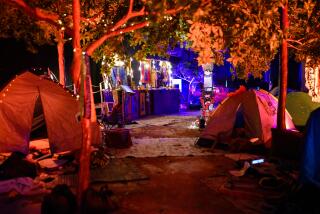Film Festival Gives Soviets Look at Jewish Life in West : Culture: ‘It seems really OK to be Jewish,’ one viewer says after seeing the first American movie.
MOSCOW — Soviet Jews, so uncertain of what it means to be Jewish after decades of being denied the right of religious and cultural expression, are seeing how Jews live, work and love in America, in Israel and in Western Europe through a weeklong festival of Jewish films here.
“It seems really OK to be Jewish, really so human,” a 24-year-old literature student, Mikhail A. Shtein, said Saturday as he watched the festival’s opening film, “Crossing Delancey.”
“In the film, people recognize, of course, that they are Jewish. But this is not a burden, and they even celebrate it. . . . To us, this is amazing.”
In “Crossing Delancey,” a 1988 romantic comedy directed by Joan Micklin Silver, the Jewish heroine tussles with her grandmother and the neighborhood matchmaker--and her own conscience--over whether to accept the proposal of a man they had found for her, a purveyor of kosher dill pickles, over the attentions of a famous novelist and another man who only visits when his wife is out of town.
“This is everyday life, not great drama,” Shtein said. “What amazes us in this film is that being Jewish is quite natural. . . . They accept it, others around them accept it, and life goes on.”
The festival, a joint project of the San Francisco Jewish Film Festival and the American-Soviet Film Initiative in Moscow, is intended precisely to “challenge all stereotypes and images of Jews,” Deborah Kaufman, its director, said at the opening Saturday evening.
Roman Spector, a prominent Jewish activist in Moscow and one of the founders of the new Confederation of Jewish Organizations and Religious Communities, added, “We Soviet Jews now have a real possibility to become acquainted with the life of Jews elsewhere--in Israel, in Europe and America, elsewhere in the Diaspora--from which we were cut off for so long.”
The isolation of Jews here led to such a loss of self-identity, other Jewish activists said, that it is likely to endure for a generation or two.
For Esther Beilin, 46, an economist, the festival is an opportunity not just to glimpse at how individuals view their Jewishness--”it’s hardly an affliction,” she said--but how Jewish communities in other countries have managed to grow and develop where those in the Soviet Union, which has the world’s third-largest Jewish population after the United States and Israel, has been so contained.
“Many of the glories of modern Judaism are rooted here in Russia, and we know nothing about them,” Beilin said. “This is more than a pity--it is our shame. . . .”
Janis Plotkin, the festival’s co-director, said that a major goal of the San Francisco festival in bringing the films to Moscow was helping Soviet Jews recover both the personal and community sense of their Jewish identity.
“We use these films to reach out to Jewish people and people of many other backgrounds to show them what is important in Jewish history, culture and community affairs,” Plotkin said. “By sharing a film together, we create a community, and community helps create a more human approach to understanding the diversity of cultures in the Soviet Union.”
Twenty-nine films from eight countries will be shown at the festival.
More to Read
Only good movies
Get the Indie Focus newsletter, Mark Olsen's weekly guide to the world of cinema.
You may occasionally receive promotional content from the Los Angeles Times.










